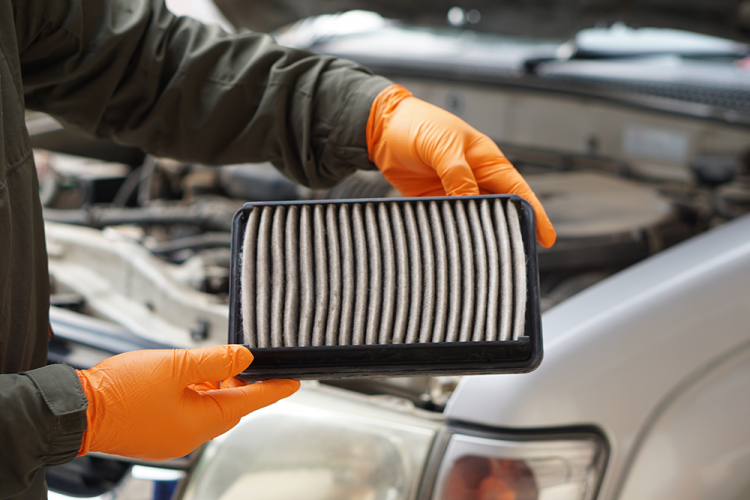Check your car’s air filter regularly to ensure optimal engine performance and fuel efficiency. A clogged air filter can lead to reduced power, poor acceleration, and increased fuel consumption. To maintain your vehicle’s health, learn how to inspect and replace the air filter as needed.
Key Takeaways:
- Regular inspection and replacement: It is important to regularly check and replace your car’s air filter to ensure optimal engine performance and fuel efficiency.
- Simple DIY task: Checking and replacing your car’s air filter is a simple task that most car owners can easily do on their own with just a few basic tools.
- Improves air quality: A clean air filter helps improve the air quality inside the car cabin and reduces the risk of respiratory issues due to dust and pollutants.
Understanding Your Car’s Air Filter
There’s no denying the importance of your car’s air filter in keeping your engine running smoothly. A clean air filter ensures that only clean air passes through to the engine for combustion, enhancing performance and fuel efficiency. Understanding the role of the air filter in your vehicle is crucial for proper maintenance and optimal engine function.
Types of Air Filters
With different types of air filters available in the market, it’s necessary to know which one is compatible with your vehicle. The two most common types are paper air filters and performance air filters. Paper air filters are affordable and suitable for everyday driving, while performance air filters offer improved airflow for enhanced engine performance. Regular maintenance is key to prolonging the lifespan of your air filter and ensuring optimal engine function. Assume that a clogged air filter can lead to poor engine performance and decreased fuel efficiency.
How an Air Filter Works
Any combustion engine requires a good supply of clean air to function efficiently. The air filter in your car traps dirt, dust, and other debris from entering the engine and causing damage. By filtering out contaminants, the air filter plays a critical role in preventing premature engine wear and maintaining optimal performance. Understanding how the air filter works can help you appreciate the significance of regular inspection and replacement.
Checking Your Air Filter
When to Check Your Air Filter
Filter Regularly checking and replacing your car’s air filter is crucial for maintaining optimal engine performance. As a general rule of thumb, it’s recommended to check your air filter every 12,000 to 15,000 miles or at least once a year. However, if you drive in dusty or polluted areas, you may need to check it more frequently.
Step-by-Step Guide to Inspecting the Air Filter
For To properly inspect your car’s air filter, follow this step-by-step guide:
| Step 1 | Locate the air filter housing |
| Step 2 | Remove the air filter housing cover |
| Step 3 | Take out the air filter |
| Step 4 | Inspect the filter for dirt, debris, or clogs |
| Step 5 | If necessary, replace the air filter with a new one |
When inspecting the air filter, pay close attention to any signs of excessive dirt or blockages. A dirty air filter can restrict airflow to the engine, leading to decreased fuel efficiency and potentially causing damage to engine components. By routinely checking and replacing your air filter, you can ensure your car runs smoothly and efficiently.
Replacing Your Air Filter
Tools and Materials Needed
Materials you will need for replacing your car’s air filter include a new air filter (make sure it matches your car’s make and model), a screwdriver or socket set for opening the air filter housing, and a rag or vacuum cleaner to clean out any debris in the housing.
Detailed Replacement Procedure
Filter replacement is a straightforward process that can be done in a few simple steps. First, locate the air filter housing under the hood of your car. It is usually a black plastic box with metal clips or screws securing it. Remove the housing cover using a screwdriver or socket set, then take out the old air filter. Check the old filter for dirt and debris accumulation. If it looks dirty or clogged, it’s definitely time for a replacement. Insert the new air filter, making sure it fits snugly in place, then close the housing cover and secure it with the clips or screws.
Plus, make sure to follow your car manufacturer’s recommendations for air filter replacement intervals. A clean air filter can improve your car’s performance, fuel efficiency, and overall engine health. Regularly checking and replacing your air filter is a simple maintenance task that can have a big impact on your car’s well-being.
Maintenance Tips and Best Practices
For optimal performance of your car’s air filter, regular maintenance checks are vital. Here are some tips and best practices to ensure your air filter is in top condition:
- Check the air filter regularly to ensure it is clean and free of debris.
- Replace the air filter according to the manufacturer’s recommendations or if it appears dirty.
- Use high-quality air filters to ensure maximum filtration efficiency.
- Inspect the air intake system for any signs of damage or leaks that could affect the air filter.
Recognizing the importance of regular air filter maintenance will help improve your car’s performance and fuel efficiency.
How to Extend the Life of Your Air Filter
Extend the life of your air filter by regularly cleaning or replacing it as needed. Avoid driving in dusty conditions for prolonged periods and parking under trees to prevent debris from clogging the filter. By following these simple steps, you can prolong the life of your air filter and maintain optimal engine performance.
Common Mistakes to Avoid
To ensure the longevity of your air filter, avoid the following common mistakes:
- Ignoring the air filter until it is severely clogged.
- Using low-quality or incorrect air filters for your vehicle.
- Neglecting to inspect the air intake system for damage.
Maintenance of your car’s air filter is crucial for ensuring proper engine function and longevity. By following these maintenance tips and avoiding common mistakes, you can optimize your vehicle’s performance and extend the life of your air filter.
Final Words
Considering all points, checking and replacing your car’s air filter is a simple yet vital maintenance task that can greatly impact your vehicle’s performance. By inspecting the filter regularly and replacing it when necessary, you can ensure that your engine receives clean air for optimal combustion. This will not only improve fuel efficiency but also extend the lifespan of your engine. Remember to consult your manual for specific guidelines on how often to replace the air filter, and don’t hesitate to seek professional help if you’re unsure about the process. With a clean air filter, your car will run smoothly and efficiently, allowing you to enjoy a safer and more reliable driving experience.
FAQ
Q: Why is it important to check and replace your car’s air filter?
A: Checking and replacing your car’s air filter is crucial to ensure optimal engine performance. A clogged air filter can restrict airflow to the engine, leading to decreased fuel efficiency, reduced power, and potential damage to engine components.
Q: How often should I check and replace my car’s air filter?
A: It is recommended to check your car’s air filter every 12,000 to 15,000 miles or at least once a year. However, if you drive in dusty or polluted environments, you may need to check it more frequently.
Q: How can I tell if my car’s air filter needs to be replaced?
A: You can visually inspect the air filter for dirt, debris, or clogs. Additionally, if you notice a decrease in fuel efficiency, engine performance, or if there is a musty smell in the car, it may be time to replace the air filter.
Q: Can I replace my car’s air filter myself?
A: Yes, replacing your car’s air filter is a relatively simple task that can be done by following the manufacturer’s instructions in your vehicle’s manual. It usually involves locating the air filter housing, removing the old filter, and installing a new one.
Q: What are the benefits of regularly checking and replacing my car’s air filter?
A: By regularly checking and replacing your car’s air filter, you can improve engine performance, increase fuel efficiency, prolong the life of engine components, and ensure a cleaner and healthier environment inside your vehicle.



